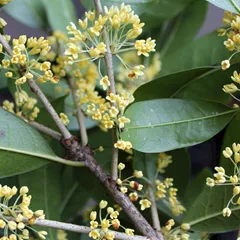Postpartum bleeding according to Chinese Medicine
The information provided here is not a replacement for a doctor. You shouldn't use it for the purpose of self-diagnosing or self-medicating but rather so you can have a more informed discussion with a professional TCM practitioner.
Postpartum bleeding factsheet
Possible causes and remedies:
Blood Stagnation and Phlegm in the Uterus
Symptoms: Painful period Abdominal pain Lochia retention and four other symptoms
Recommended formula: Gui Zhi Fu Ling Wan
Blood Stagnation in the Directing and Penetrating Vessels
Symptoms: Anxiety Breast pain Irritability and thirteen other symptoms
Recommended formula: Gui Zhi Fu Ling Wan
In Chinese Medicine, postpartum bleeding can be associated with two so-called "patterns of disharmony". Chinese Medicine sees the body as a system, not a sum of isolated parts. A "pattern" is when the system's harmony is disrupted. It is not equivalent to the Western concept of "disease", as a matter of fact here postpartum bleeding can be caused by two different patterns.
To understand whether someone's postpartum bleeding might be caused by a given pattern, one needs to look for signs and symptoms associated with the pattern beyond what one might typically experience from postpartum bleeding alone. For instance when postpartum bleeding is caused by the pattern Blood Stagnation and Phlegm in the Uterus, patients also experience symptoms such as persistent uterine bleeding of purple or dark blood, lower abdominal distension and pain that increases with pressure, fibroids and cysts in the lower abdomen and painful period.
We've listed below a description of the two patterns associated with postpartum bleeding so that you can start to get an understanding of the various possibilities according to Chinese Medicine.
Once identified, patterns are often treated using herbal formulas. Drinking herbal infusions is the most common remedy in Chinese Medicine, together with acupuncture. Here we detail below two formulas that can help treat the various patterns associated with postpartum bleeding, depending on which pattern fits your profile.
The two "patterns of disharmony" associated with postpartum bleeding
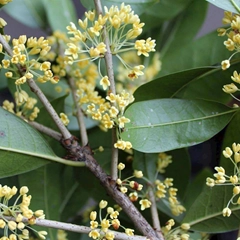
Cinnamon Twigs (Gui Zhi) is the key herb for Gui Zhi Fu Ling Wan, a formula used for Blood Stagnation and Phlegm in the Uterus
Blood Stagnation and Phlegm in the Uterus
Recommended herbal formula: Gui Zhi Fu Ling Wan
Symptoms: Painful period Abdominal pain Lochia retention Irregular menstruation Fibroids and cysts in the lower abdomen Persistent uterine bleeding of purple or dark blood Lower abdominal distension and pain that increases with pressure
Postpartum bleeding might be due to Blood Stagnation and Phlegm in the Uterus if the condition is paired with typical pattern symptoms such as persistent uterine bleeding of purple or dark blood, lower abdominal distension and pain that increases with pressure, fibroids and cysts in the lower abdomen and painful period.
Read more about Blood Stagnation and Phlegm in the Uterus here

Cinnamon Twigs (Gui Zhi) is the key herb for Gui Zhi Fu Ling Wan, a formula used for Blood Stagnation in the Directing and Penetrating Vessels
Blood Stagnation in the Directing and Penetrating Vessels
Pulse type(s): Choppy (Se), Wiry (Xian)
Tongue color: Bluish-Purple
Recommended herbal formula: Gui Zhi Fu Ling Wan
Symptoms: Anxiety Breast pain Irritability Restlessness Breast lumps Painful period Umbilical pain Lochia retention Abdominal masses Breast distention Tendency to worry Dark colored blood Lower abdominal pain Irregular menstruation Brown vaginal discharge Dark clots in menstrual blood
Postpartum bleeding might be due to Blood Stagnation in the Directing and Penetrating Vessels if the condition is paired with typical pattern symptoms such as irregular menstruation, brown vaginal discharge, dark clots in menstrual blood and painful period. Similarly, patients with Blood Stagnation in the Directing and Penetrating Vessels typically exhibit choppy (Se) or wiry (Xian) pulses as well as a bluish-purple tongue.
Read more about Blood Stagnation in the Directing and Penetrating Vessels here
The two herbal formulas that might help with postpartum bleeding
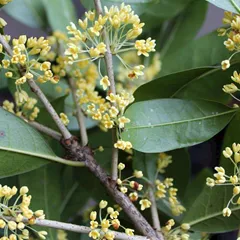
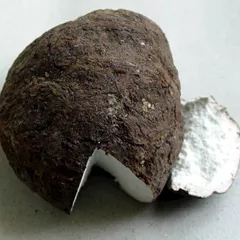
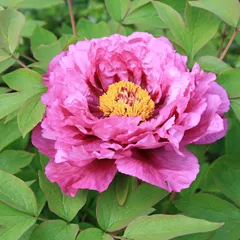
The top herbs in Gui Zhi Fu Ling Wan are Cinnamon Twigs (Gui Zhi), Poria-Cocos Mushrooms (Fu Ling) and Red Peony Roots (Chi Shao)
Gui Zhi Fu Ling Wan
Source date: 220 AD
Number of ingredients: 5 herbs
Key actions: Promotes Blood and lymphatic circulation, thus eleminates Blood Stagnation. Softens and resolves hard lumps such as cysts and fibroids.
Why might Gui Zhi Fu Ling Wan help with postpartum bleeding?
Because it is a formula often recommended to help with the patterns Blood Stagnation and Phlegm in the Uterus and Blood Stagnation in the Directing and Penetrating Vessels which are sometimes associated with postpartum bleeding. If any of these patterns look like something you might suffer from, this formula might help (although please seek confirmation with a professional practitioner beforehand).

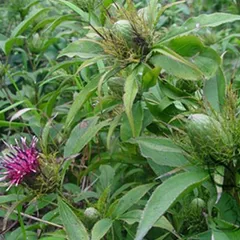
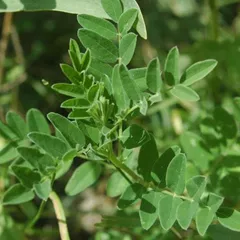
The top herbs in Gu Chong Tang are Cornelian Cherries (Shan Zhu Yu), Atractylodes Rhizomes (Bai Zhu) and Milkvetch Roots (Huang Qi)
Gu Chong Tang
Source date: 1918-1934
Number of ingredients: 10 herbs
Key actions: Augments Qi . Strengthens the Spleen. Stabilizes the Penetrating Vessel. Stops bleeding.
Why might Gu Chong Tang help with postpartum bleeding?
Because it is a formula often recommended to help treat , a pattern sometimes associated with postpartum bleeding. If it looks like you might suffer from , this formula might help (although please seek confirmation with a professional practitioner beforehand).
Symptoms related to postpartum bleeding
Painful period Irregular menstruation Lochia retention Persistent uterine bleeding of purple or dark blood Lower abdominal distension and pain that increases with pressure Fibroids and cysts in the lower abdomen Abdominal pain Brown vaginal discharge Dark clots in menstrual blood Dark colored blood

